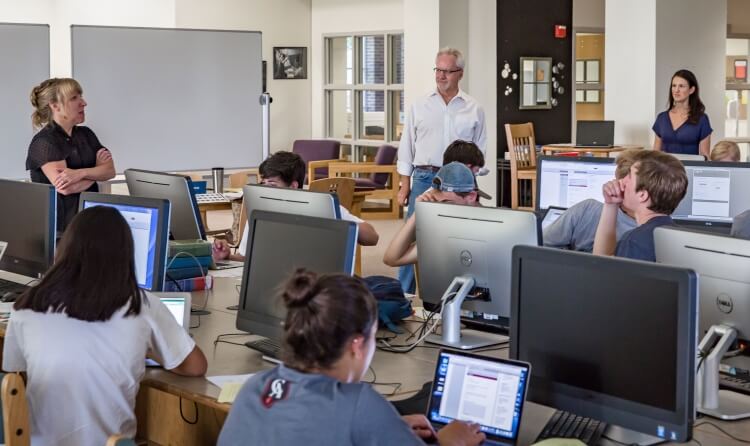Every fall, for the almost 30 years that I did admissions work at Harvard and Middlebury, I saw plenty of enthusiastic, bright-eyed freshmen arrive on campus, eager to get started on their college careers. But every year, I also saw some who seemed unengaged, with a slightly dazed look in their eyes, as if they had just stepped off a wild roller-coaster ride.
In some respects, many of them had. In our culture’s relentless pursuit of the perfect college for our students, we oftentimes base too many of the decisions made during a student’s secondary school years on the impact they will have on the judgment of some group of strangers in an admissions office down the road during the decision-making process. Sometimes, that can be a helpful mindset, but frequently it can be taken too far, when every decision is dictated by an attempt to do what “they” are looking for. That can also lead students and parents to lose sight of the fact that “getting in” is not an end in itself, but rather a means to an end. And looking at acceptance to college as an end in itself can easily lead, in turn, to that dazed, post-roller-coaster look in a student’s eyes, with new freshmen asking themselves as they arrive on some college campus, “OK, so I am finally here. Now what?”

College Admissions at Colorado Academy
At Colorado Academy, we do everything we can to keep the college admissions process in its proper perspective and to encourage students not to define themselves by where they apply to college or where they enroll, but by where they will be most happy and therefore most successful and able to fulfill their hopes and dreams. We also encourage students to take as much ownership of the college application process as possible, because in our experience, that is the best way for them to become invested in the outcome and to take more responsibility for their success once they get to college.
As a result, I think most students graduating from Colorado Academy are ready to move on to the next step in their educations, and most of them end up hitting the ground running at their colleges. However, every year a few students, sometimes to take a break from the lock-step mindset with which some have approached their secondary school educations, or to expand their intellectual or personal horizons, or maybe just to have a different kind of life experience, have found value in doing something different for six months or a year before enrolling in college. This is a trend that has gained quite a lot of traction in the US recently, and although it is not yet common, I think that for many, taking time off between high school and college can be a very effective way of reminding oneself of what one’s education is really all about, particularly if that time is well spent.
Gap year experiences
After she graduated from CA, Kiira Antenucci ‘16 spent seven months with the National Outdoor Leadership School “searching for the better me” in Chile and Patagonia. After returning home, she pursued her interest in the medical field, earning her EMT. Today, she is at University of Puget Sound, with no regrets. “My gap year was the best decision that I could have made for myself, because a year ago I wasn’t ready for college,” she says. “Now I am invested in my future and have direction.”
Natalie Walsh ’17 plans to attend Lehigh University this fall, but until then, she is taking a year to travel and volunteer around the world. “During a gap year, you definitely grow up very fast,” she says. “I’ve seen so much and met so many people who’ve had an irreversible effect on my life, and I have learned so much about myself.”

Gap year research
A common concern, especially for parents, is that students could lose the hard-earned study skills that they have gained during high school if they take a year off before enrolling in college. Several studies, however, show exactly the opposite. When I was head of admissions at Middlebury in Vermont, we did a controlled study of students there who had taken a gap year before enrolling, and we discovered that not only did gap year students perform, on average, better than those students who did not take a gap year, they even performed better than we expected they would, based on their academic credentials at the point of admission. The same methodology was replicated at the University of North Carolina at Chapel Hill with their own gap year students, and even stronger results emerged from that study, showing that students who had taken a gap year overperformed at even higher levels.
Why is that? I believe it is because, when students step out of their traditional educational settings, they can more readily recognize the connections that exist between their education and their day-to-day lives, and they become more mature, more focused, and less inclined to engage in some of the behaviors that characterize too many freshmen years in college. One dean at Tufts University even says it this way: “Every student in the US takes a gap year. It’s called freshman year.” Colleges recognize this tendency towards a sometimes less mature and focused approach during freshman year as well, and as the gap year trend has gained momentum, they have begun supporting the movement themselves. Some institutions even offer their own gap year programs, and others provide financial support for students who want to take one. Many, including even the most selective institutions, actively encourage admitted students to take a gap year before enrolling.
Another benefit of taking a gap year is that for many students, it can be the first opportunity to do something, for once, for the pure love of it, and not because of how it might enhance their college applications. Also for that reason, students considering taking a gap year should still go through the college admissions process during their senior year, and after deciding where they want to matriculate, request a semester or year-long deferral from their college of choice at that point. Virtually all institutions will be willing to support that request, and some will even allow merit-based scholarships to be transferred to the following year.
How should I spend a gap year?
So what does one do with a gap year? There are as many answers to that question as there are students taking one, but it can be anything from work or internships to structured programs around the country or the world to completely self-designed experiences, or combinations of all of the above. It really depends upon what the student wants to get out of it, and the student should be very intentional about determining what that is. Although there are many higher-cost programs out there, taking a gap year also does not have to entail a lot of extra expense, and in some cases students can even earn money during the experience.
Bill Hopping, father of Alec Hopping ’15, reports that Alec’s gap year was “not very expensive” because he cooked on his own in hostels and also stayed with local families while traveling internationally. “We know he was so much better prepared for college after this,” Bill Hopping says. “Alec accumulated lifetime experiences that are foundations for the perspective he brought to Cornell.”
All of us in the College Office would encourage you to think about this alternative approach to your son’s or daughter’s year after graduating from CA, and encourage him or her to do so as well. In more than 40 years at both ends of the college admissions process, I have yet to meet a single student, among hundreds who have taken a gap year before enrolling in college, who regretted having done so. And don’t you wish you had had a year off to do something different before you embarked on your own college experience and career?
